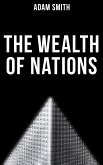The Wealth of Nations - Adam Smith - An Inquiry into the Nature and Causes of the Wealth of Nations, generally referred to by its shortened title The Wealth of Nations, is the magnum opus of the Scottish economist Adam Smith. First published in 1776, the book offers one of the world's first collected descriptions of what builds nations' wealth and is today a fundamental work in classical economics. Through reflection over the economics at the beginning of the Industrial Revolution the book touches upon such broad topics as the division of labor, productivity, and free markets.
Dieser Download kann aus rechtlichen Gründen nur mit Rechnungsadresse in A, B, BG, CY, CZ, D, DK, EW, E, FIN, F, GR, H, IRL, I, LT, L, LR, M, NL, PL, P, R, S, SLO, SK ausgeliefert werden.








